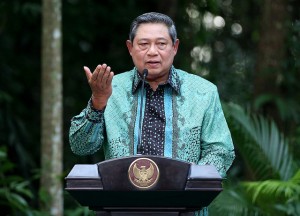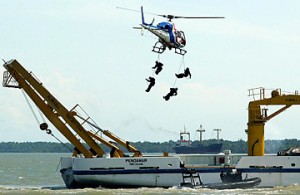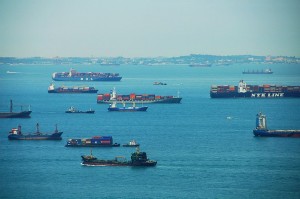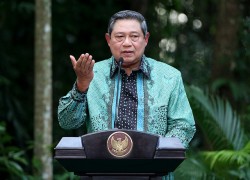The following is the first cross-post of an article that originally ran on the site of our new partners at Security Scholar, an Australia-based security blog. First published last month, the relation of Indonesia’s future to Australian maritime security issues was reiterated with three recent hi-profile incidents of Australia-bound refugee vessels in distress in Indonesian waters. We look forward to learning more about the Australian maritime security outlook from our friends down under:
By Natalie Sambhi
Last month at the Australian National University (ANU) Professor Hugh White delivered a solid speech that lucidly and methodically explained why we, Australia, should be considering Indonesia with more care.
 Projected to be the world’s fourth largest economy in a matter of decades and increasing in clout as a regional power, if not great power, Indonesia will be a force to reckon with, according to White. As such, many Australians will be forced to overturn their assumptions about Indonesia as a poor and weak country. White implored the audience to consider ways of redefining the bilateral relationship with Indonesia beyond third order issues like drug smuggling, people trafficking, border protection, and counter terrorism. Pointing to further evidence that the relationship was not as robust as Government would have us believe, White pointed to “fault lines” in the relationship caused by Australia’s involvement in East Timor’s independence which, for some time, severed diplomatic relations completely.
Projected to be the world’s fourth largest economy in a matter of decades and increasing in clout as a regional power, if not great power, Indonesia will be a force to reckon with, according to White. As such, many Australians will be forced to overturn their assumptions about Indonesia as a poor and weak country. White implored the audience to consider ways of redefining the bilateral relationship with Indonesia beyond third order issues like drug smuggling, people trafficking, border protection, and counter terrorism. Pointing to further evidence that the relationship was not as robust as Government would have us believe, White pointed to “fault lines” in the relationship caused by Australia’s involvement in East Timor’s independence which, for some time, severed diplomatic relations completely.
Against the backdrop of a shift in the strategic balance in Asia, and as Australia aligns itself towards the so-called “Asian Century”, White invited us to consider whether Indonesia would be an asset or an ally. In his view, Indonesia holds great potential to shield Australia from the threat of major powers in the region, if we get our bilateral relationship right. If we do, then we may start to think about the kinds of Defence capability that would complement the armed forces of Indonesia so that both countries could work towards a kind of “forward defence”. White wrapped up his speech with five points to improve the relationship: 1) improve DFAT political reporting, 2) focus less on third order issues and more on China, 3) de-emphasise the role of aid in relating to Indonesia, 4) abolish travel advisories (as negative ones have tended to upset Indonesia), and 5) increase the importance of the bilateral relationship in Australian politics.
There are, however, a few extra elements in relation to Australia-Indonesia ties White might have explored in his speech (and I’m sure he would have, given more time), and I would like to take up three of his points to develop these further.
First, perceptions matter. In building his case for cultivating better relations with Indonesia, White used excerpts from Indonesian President Yudhoyono’s 2010 address to the Australian Parliament. In the address, the President underscored mistrust and misperceptions that beleaguered the bilateral relationship in the past. White referred to several parts of the address, but here I have selected the one I think is most salient:
I was taken aback when I learned that in a recent Lowy Institute survey 54 per cent of Australian respondents doubted that Indonesia would act responsibly in its international relations. Indeed, the most persistent problem in our relations is the persistence of age-old stereo-types—misleading, simplistic mental caricature that depicts the other side in a bad light. Even in the age of cable television and internet, there are Australians who still see Indonesia as an authoritarian country, as a military dictatorship, as a hotbed of Islamic extremism or even as an expansionist power. On the other hand, in Indonesia there are people who remain afflicted with Australiaphobia—those who believe that the notion of White Australia still persists, that Australia harbours ill intention toward Indonesia and is either sympathetic to or supports separatist elements in our country.”
It will take some time for these perceptions to erode. But it is equally important that we do not replace them with those that may mischaracterise Indonesia. Let’s take Indonesia’s democracy, for example. Lowy’s poll also states that “62% of Indonesians say democracy is preferable to any other kind of government and there is near universal agreement on three core democratic values – the rights to a fair trial, freely express yourself and vote in national elections.” How this is practiced, however, may be a different story.
A New York Times article warned that Indonesia is no model for a Muslim democracy, citing its mixed human rights record and lack of religious freedom as evidence. Admittedly, the case by the Human Rights Watch author comprises a quick grab of examples presented in highly emotional terms, but the take-home message is clear: Indonesia’s democracy is different. Sure it’s a no-brainer, but it may surprise us to learn the extent to which ethnic and religious criteria shape Indonesia’s elections. That is, Javanese Muslims have, historically, dominated politics and are perceived to be more viable candidates than their non-Javanese, non-Muslim counterparts. Given our Prime Minister is a non-religious, unmarried, Welsh-born woman, that a potential leader is discriminated against in ethno-religious terms is anathema to our political system should give us a moment’s pause for thought.
While we, and others like the US, are turning to enthusiastically embrace the democratic character of our northern neighbour, it would serve us well to carefully appraise the challenges of Indonesia’s ongoing democratic development. This is not to say this is a bar to good relations; quite the contrary. Australia must make an effort to understand these challenges and know how to engage with them without being paternalistic. If Australia and Indonesia are to work closely together in the Asian century, a deep understanding of each other’s political systems and working with them is necessary.
Second, Indonesia will be more than a middle power, and even perhaps a great power. There has been much discussion on whether Indonesia, given current growth rates, could outstrip India’s position in the BRICS grouping. Despite this optimism, according to one commentator (and it’s worth reading Grenville’s post), there are still significant political challenges holding Indonesia back. For one, there appears to be no clear successor to President SBY, with current candidates ranging from former generals like Prabowo Subianto, to Megawati Sukarnoputri, to tycoons like Aburizal Bakrie. Building on the discussion above on Indonesia’s democratic practices, with speculation abound about the nomination of Ani Yudhoyono, wife of the Indonesian President and sister of the Indonesian Army’s Chief of Staff, one wonders about the state of nepotism there. I hope I’m wrong.
This three–part series in last week’s Jakarta Globe exposes the lack of military business reform in the country. Without robust systems of accountability and practices that encourage transparency and due diligence, Indonesia risks undermining its own developments. Reliable maintenance of the rule of law remains problematic. While Indonesia has made attempts to grapple with military reform and eradicate corruption, these articles show that the country still has a long way to go.
As Indonesia grows in wealth and in confidence, it will head down the road of becoming a middle power. But its ability to transform into a great power will be hindered by domestic political challenges, and thus an inability to translate its wealth into military capability commensurate with great power status.
The right kind of President—he/she who can best cultivate the country’s wealth from natural resources, maintain high economic growth rates, reduce poverty, spur reform, maintain Indonesia’s clout within ASEAN, consolidate territorial integrity and domestic security, among other wishlist items—will no doubt help Indonesia comfortably secure a place in the upper bracket of middle power status. But what happens when Indonesia’s future President comes from a cadre of military officers who served in East Timor and who might be Australiaphobic?
Earlier this week, Australia’s Ambassador to Indonesia, Greg Moriarty, warned of growing economic nationalism in the country resulting in investment conditions that are not necessarily in Australia’s interests. Let’s hope this trend does not continue.
Third, White stressed the de-emphasis of aid in the relationship. He stated that there is a particular psychology attached to the receipt of aid. While there are many people in Indonesia who live in poverty and need our help, it was no basis for the bilateral relationship or the lens through which we should see Indonesia. As White underscored in an interview last month, it leads Australians to treat Indonesians in a patronising manner. White’s suggestion that we redirect aid money towards sending 10,000 Australian students each year to learn about Indonesia is well-intentioned, but we’d be hard-pressed getting even a third of that number across the education system. But again, I hope I’m wrong.
As one blogger pointed out this week, language study comes from an interest in culture. But it also comes from repeated exposure to the other culture and repeated contact with people. That Indonesia features obliquely in popular soap operas is not indicative that it is part of our thinking. The solution to piquing interest in Indonesian culture will come with the sense that Asia is part of Australia. That is, as continental European faces are as commonly featured in mainstream media alongside Anglo-Celtic ones, familiarity with Asia will come with increased exposure: particularly newsreaders, politicians, business and community leaders, the actors in advertising campaigns, performers, and athletes. Exchanges are useful but they are usually led by travellers and students who are already willing to engage beyond Bali’s beaches. Perhaps Indonesian-Australians could lead the charge, perhaps change will come with time.
It has been 14 years after the fall of Suharto and despite the challenges that are still abound, Indonesia has transformed remarkably. I want to be optimistic about the future of the relationship between Australia and Indonesia, and I am in furious agreement with White about strategic and cultural imperatives that should drive this, but we must be wide-eyed about the challenges that lay ahead.
Natalie Sambhi is a Hedley Bull Scholar in International Relations and a Masters graduate of the Asia-Pacific College of Diplomacy at the Australian National University. She currently researches and edits on a freelance basis, and is a contributor and co-editor of Security Scholar
 Amid reports of hijackings and narrow escapes by merchant vessels in the Gulf of Guinea, West African piracy has begun to capture international attention. Meanwhile, NATO’s Operation Ocean Shield and the EU’s Atalanta maintain presence with other international partners in the Gulf of Aden, securing a crucial trade route against the threat of Somali piracy. However, the waterways of Southeast Asia are now almost entirely absent from the Western media narrative regarding the threat posed by piracy to international trade. This comes as some surprise, since piracy in this part of the world is very much on the rise.
Amid reports of hijackings and narrow escapes by merchant vessels in the Gulf of Guinea, West African piracy has begun to capture international attention. Meanwhile, NATO’s Operation Ocean Shield and the EU’s Atalanta maintain presence with other international partners in the Gulf of Aden, securing a crucial trade route against the threat of Somali piracy. However, the waterways of Southeast Asia are now almost entirely absent from the Western media narrative regarding the threat posed by piracy to international trade. This comes as some surprise, since piracy in this part of the world is very much on the rise.



